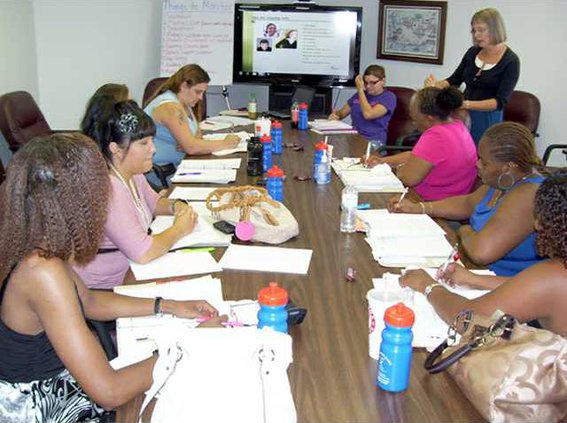The author Loren Eiseley once wrote a story about a man who liked to write at the beach.
One day, while the man was writing, he noticed a boy throwing starfish into the ocean. When the man asked what he was doing, the boy replied that the tide was going out and if he didn’t throw the starfish back into the water, they would die.
The man questioned the boy, explaining that his actions couldn’t possibly make a difference – after all, there were miles upon miles of beach filled with starfish.
In answer, the boy picked up another starfish and threw it into the ocean, saying “it made a difference for that one.”
According to Amy Tavio, that’s what it means to be a volunteer for Court-Appointed Special Advocates for Children.
CASA is a nationwide, non-profit group advocating for neglected and abused children in the court system. Atlantic Area CASA is the local chapter, serving Bryan and seven other counties.
“We recruit, screen and train volunteers to basically be an officer of the court,” said Atlantic Area Volunteer Coordinator Jessica Moody. “They visit the children and talk to the families, teachers, doctors – anyone involved in the child’s life. These are foster cases, neglect cases, abuse cases ... our goal is to find them a safe home as quickly as possible.”
CASA volunteers compile their findings for court reports and make recommendations they believe to be in the child’s best interest. The judge uses the information before making a decision on each case.
Moody said children who have a CASA advocate spend less time in foster care.
“Our system is so overburdened that having a CASA volunteer really bridges the gap so that these kids don’t fall through the cracks,” she explained. “A CASA takes no more than two cases at a time, so they can really get to know the parties involved and what their needs are.”
Currently, Atlantic Area CASA has 40 volunteer advocates serving 70-80 children across eight counties. Volunteers serve in the county in which they reside.
“We currently have for Bryan County only three advocates,” said Moody. “We need more. We really do.”
To become a volunteer, candidates need only the desire to help children; no legal background is necessary. Thirty hours of training are spread out over 5 weeks, and once a CASA volunteer is sworn in, their time commitment is no more than ten hours a month.
“Being a CASA volunteer remains the most powerful and rewarding experience of giving and making a difference I have lived,” said Tavio, former CASA volunteer coordinator. “Taking a stand for a child who has lived with abuse or neglect, being their voice in court, may very well be the first time that child ever gets heard or experiences that they do matter, and that they are loved and worthy.”
“I realized what a difference I was making, not just as a role model or a familiar face they saw, but making a difference in their actual lives,” Moody said. “My recommendations affected their lives and that was just so profound for me … we empower everyday people to help these children and make their lives better. I think people would be surprised how many children are in this system and need help, and we have the power as citizens to change that.”
For more information on volunteering, please visit www.atlanticcasa.org or email atlanticcasa@coastalnow.net.
CASA volunteers advocate for children
Making a difference


Sign up for our e-newsletters